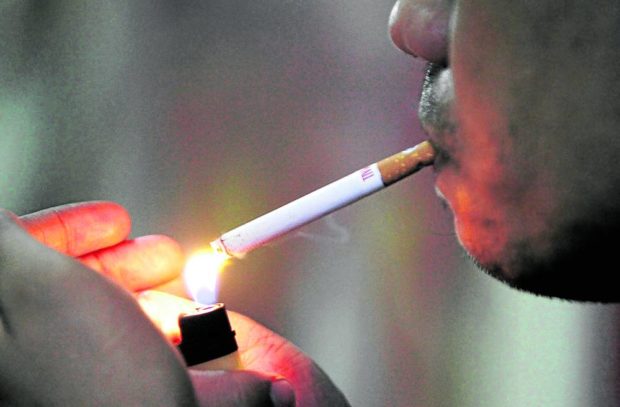2022 starts with tax, price hikes on cigarettes, alcohol

HAZARDOUS TO YOUR WALLET TOO: Effective Jan. 1, the excise on cigarettes is P55 per pack, from P50 last year. (Photo by RICHARD A. REYES / Philippine Daily Inquirer)
MANILA, Philippines — The new year begins with another increase in “sin” taxes, meant not only to discourage smoking and drinking but also to raise more revenues to finance the universal health care (UHC) program being implemented by Philippine Health Insurance Corp. (PhilHealth).
Effective on Jan. 1, the excise on cigarettes is now P55 per pack, from P50 last year. The annual P5 increase in this tax until it reaches P60 per pack of cigarettes is in accordance with Republic Act No. 11346, or the Tobacco Tax Law of 2019.
And under Republic Act No. 11467, which amends the National Internal Revenue Code of 1997 when it comes to so-called sin products, the excise on conventional freebase or classic nicotine vaping products increases this year to P55 per 10 milliliters from P50 last year, while the tax on nicotine salt vapes is now P47 per ml, from P42 in 2021.
RA 11467 also jacked up the excise on distilled spirits — brandy, gin, rum, tequila, vodka, and whiskey — to P52 per proof liter from P47 in 2021, on top of the ad valorem tax of 22 percent of the net retail price.
Beer products including lager, ale, and porter have an excise of P39 per liter this year, up from P37 last year.
Meanwhile, the excise on wines has been increasing by 6 percent annually from the base of P50 per liter in 2020 when RA 11467 was enacted into law.
Collections
Despite the pandemic and its resulting lockdowns, which limited sales and distribution of sin products especially in 2020, sin tax collections from cigarettes and alcoholic beverages rose to a total of P227.6 billion from P224.6 billion in 2019 — exceeding the conservative P201.5-billion target.
The government has also been targeting increases in sin tax collection even amid reports of a thriving illicit cigarette trade, including smuggling in at least four ports flagged by lawmakers as “hot spots,” as well as the manufacturing of unregistered products in some economic zones.
The latest estimates of PMFTC Inc., the country’s affiliate of Philip Morris International, show that the sale of smuggled or fake cigarettes grew to 8.6 percent of the market last year compared with about 5.5 percent in 2020.
According to the Bureau of Internal Revenue, the 2.5 million illicit cigarette packs seized in 2021 amounted to some P123.3 million in lost tax revenues.
The Bureau of Customs, for its part, reported that year apprehending about 100 illicit cigarette traders and confiscating 38,827 master cases or P1.3 billion worth of illicit cigarettes. Foregone excise from these contraband was estimated at P970.6 million.
Subsidy
Amid those challenges, Finance Secretary Carlos Dominguez III vowed that the government would continue to finance the UHC program, which was enacted into law in 2019.
PhilHealth has actually been receiving the largest subsidy among all government-owned and/or -controlled corporations (GOCCs) since 2014.
The record-high 2022 national budget of P5.02 trillion allotted P80 billion to PhilHealth to cover premium subsidies for indirect contributors—including 13.2 million poor households and 7.3 million senior citizens.
The latest data from the Bureau of the Treasury also show that the government extended about the same amount, P76.9 billion, to that GOCC as of last November—or nearly half of the P163.4 billion allocated to other state corporations during that 11-month period.
On the other hand, PhilHealth has been criticized for failing to settle COVID-19 claims by private hospitals and for alleged corruption and mismanaged funds.
Furthermore, health costs and economic losses due to the consumption of sin products remained considerable despite the increase in sin tax collection, according to a recent report by Washington-based think tank Center for Global Development.
The Department of Finance said it was working on a “playbook” of strategies, including possibly new or higher taxes, which may be implemented by mid-2022 when a new administration takes over.
Disclaimer: The comments uploaded on this site do not necessarily represent or reflect the views of management and owner of Cebudailynews. We reserve the right to exclude comments that we deem to be inconsistent with our editorial standards.
